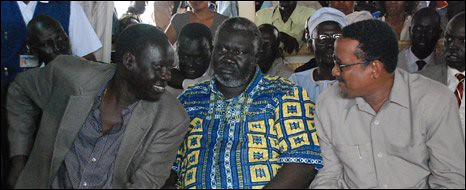
Officials from Abyei have agreed to an international ruling related to the status of the oil-producing area of the central African nation of Sudan. There has been an eruption of violence in Abyei since the elections., a photo by Pan-African News Wire File Photos on Flickr.
Tuesday 14 August 2012
Abyei joint committee signs peaceful coexistence pact
August 13, 2012 (JUBA) - The Abyei Joint Oversight Committee (AJOC) have signed a pact highlighting the necessity to strengthen social ties and to embrace living in harmony to restore and promote peaceful coexistence between the groups which have rival claims over the disputed area.
The fertile oil-producing region, which lies on the new international border between Sudan and South Sudan, is claimed by both sides and has been the source of much tension since South Sudan’s independence.
However, the deal signed on Saturday in Abyei town by officials representing Sudan and South Sudan, represents further progress towards resolving the thorny issue. As demanded in a UN Security Council resolution in May both sides pulled their armed forces out of the area.
Al-Kheer Al-Fahim, representing the government of Sudan was reported to have expressed the commitment of the ruling National Congress Party to reaching a deal on the formation of an administrative and civil institutions.
Shortly before South Sudan’s independence last year the Sudan Armed Forces attacked and occupied Abyei town in response to an attack on a convoy leaving the area, blamed on southern forces. Over 100,000 people were displaced.
An Ethiopian-led UN force (UNISFA) has been deployed to the area and after SAF pulled of the area members of the southern-aligned Dinka Ngok have begun to return to the area.
Al-Fahim added that the signed document between the two sides affirmed the need to continue dialogue. Under the 2005 peace agreement the status of Abyei was to be decided by a referendum but the vote was scuppered as South Sudan refused to allow the members of the Misseriya - an Arab nomadic group that spend much of the year in the area with their cattle - to take part.
Luka Biong Deng Kuol, a Co-Chair of the Abyei Joint Oversight Committee representing South Sudan commended the signing of the truce, describing it an indication of commitment of South Sudan’s president Salva Kiir and his Sudanese counterpart Bashir to resolving dispute over his native region of Abyei. He commended the two Presidents for showing exerting efforts to find solution to outstanding issues between the two countries.
The official explained that the recent agreement on oil would give a major push to ongoing efforts to resolve remaining controversial issues including Abyei. Biong said the South Sudan delegation carries a mandate from President Salva Kiir to work for bringing about solution and peaceful co-existence between communities in the area.
Biong returned to Juba over the weekend with the document, which agreed on the peaceful co-existence between the Dinka Ngok and the Missiriya. The agreement was reached after the sixth meeting of the Abyei Joint Oversight Committee (AJOC) held for two consecutive days in Abyei area.
Higher level officials and traditional leaders in the area told Sudan Tribune on Sunday that the meeting was attended by influential representatives from both countries as well as the United Nations and African Union.
The two-day meeting culminated in the document highlighting necessity to continue dialogue between the two parties contesting ownership of the fertile and oil producing area.
The document also expressed a mutual respect between the Misseriya and Dinka Ngok, including restoration of historic relations between the two communities. The Sudan-South Sudan international border is based on the boundary drawn up by Britain during colonial rule.
The two sides agreed that there was a need to communicate the contents of the documents to their communities, prior to convening a reconciliation conference.
Representatives of the African Union and UNISFA Force Commander welcomed the agreement and reportedly pledged to exert efforts to ensure that the document is implemented on the ground.
(ST)
No comments:
Post a Comment